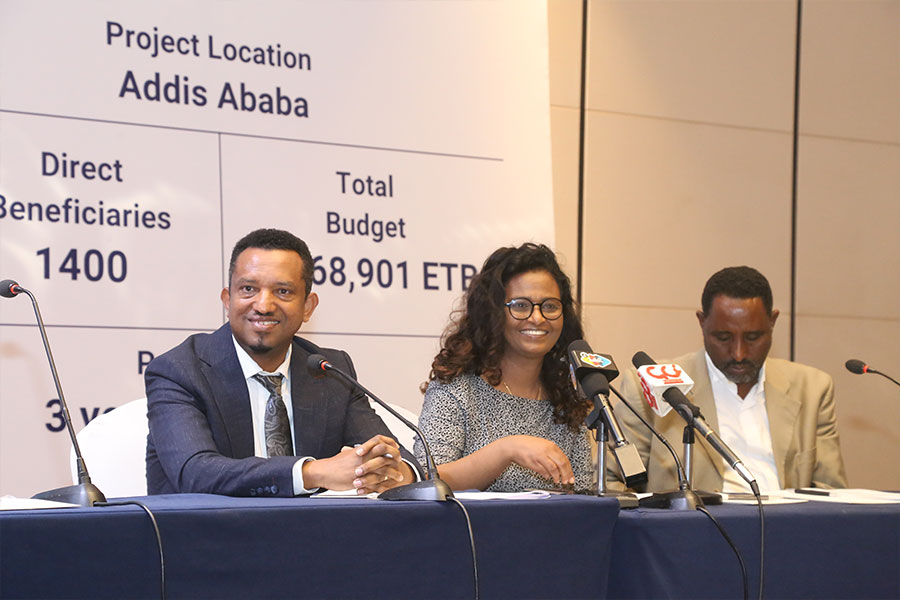
Commentaries | Nov 02,2019
Nov 27 , 2021
By Eden Sahle
There are rare people whose life trajectory is marked by the brave choices they made at a time of uncertainty and hardship. One of them is Trhas Mezgebe, who ventured into harm’s way and made a difference in many women’s and communities’ lives. Even moments before she breathed her last breath, on a Monday, she had unwavering commitment and passion to those she cared deeply about. She kept her illness from everyone throughout all of it, working tirelessly to make other people’s lives better.
She was always there, offering help, guidance, and encouragement to many. She was soft-spoken, gentle, and respectful, yet unmovable in her determination to fight abuse against women.
Trhas came to Ethiopia over two decades ago from Eritrea as a fresh high school graduate. She planned to travel to Europe, study, get married and start her own family. As she waited for her visa in the town of Pawe, Metekel Zone of the Benishangul-Gumuz Regional State, working for an international company, her life changed forever.
She was driving in Pawe with her friend when she came across a young woman’s horrifying suicide scene. The woman had lost three of her children in childbirth and ended her life to escape society’s shaming. At that time in the village, it was common to send women off alone to give birth by themselves in the woods. Those women who did not come back with a child in their arms were considered cursed and will be outcasts from family and communities. The harmful culture leaves a grieving mother who lost her child to dig a hole and bury her baby’s body alone with no one comforting her.
Trhas had witnessed that women in Pawe used to be isolated during delivery and after until they became clean from childbirth bleeding. They were forced to leave their home during menstruation and remain isolated. The culture believed that women’s menstrual blood brought with it a curse, thus triggering the segregation that left women emotionally tormented. Women were left in pain and died all alone because of the culture that believed babies born inside a house or with assistance would be unhealthy and bring the family bad luck.
Women also suffered from female genital mutilation, untreated fistulas, and child marriage. Women and girls were forced to carry heavy loads and treated as property as families exchanged them in marriage to several men in return for dowry.
This culture, which stripped women of their dignity and human rights, humiliating them in every possible way, angered Trhas. It compelled her to offer a helping hand, even if it meant she had to sacrifice her dreams and goals in life. She could not stand the fact that women were shamed and cursed because of their natural gifts that brought life to the world. She could not leave behind the young women thrown out on the streets when they suffer fistulas due to child marriage and birth complications.
For Trhas, a new ambition was born. She was determined to fight for the rights of these women. She started supporting them from her own limited income. When she lost her job, she used the cash her brother used to send her for living costs to support the women.
It was not long after she started her work that the Network of Ethiopian Women’s Associations and others discovered her and offered financial support for her initiative. Her organisation, Mujejeguwa Loka Women Development Association, officially registered almost two decades ago, expanded the helping hand.
Trhas understood change starts by educating families and communities. Care was her language of communication with the girls and women, whose local tongue she did not speak at first. The love and care she offered did not need translation as it spoke for itself.
Her decades of hard labour paid off. Enough awareness has been brought to the town that the community lets women give birth in health centres and provide postpartum care. She built schools and hired teachers to educate men and women. She proved that no one needs wealth or funding but a heart willing to bring a positive change in society.
Although her physical presence is no longer with us, her incredible work changed an entire community and the lessons she taught many of us lives on. It is such a hands-on approach to change people's and communities' lives that helps us keep faith in the human species, and if enough people practise giving back to the community, it will be possible to make the world a better place.
PUBLISHED ON
Nov 27,2021 [ VOL
22 , NO
1126]

Commentaries | Nov 02,2019

Sunday with Eden | Jan 01,2022

Radar |

Viewpoints | Apr 20,2024

Radar | Sep 24,2022

Featured | Sep 23,2023

Viewpoints | Jun 22,2024

Life Matters | Jul 09,2022

Radar | Sep 23,2023

Commentaries | Dec 11,2020

My Opinion | 131981 Views | Aug 14,2021

My Opinion | 128369 Views | Aug 21,2021

My Opinion | 126307 Views | Sep 10,2021

My Opinion | 123925 Views | Aug 07,2021

Dec 22 , 2024 . By TIZITA SHEWAFERAW
Charged with transforming colossal state-owned enterprises into modern and competitiv...

Aug 18 , 2024 . By AKSAH ITALO
Although predictable Yonas Zerihun's job in the ride-hailing service is not immune to...

Jul 28 , 2024 . By TIZITA SHEWAFERAW
Unhabitual, perhaps too many, Samuel Gebreyohannes, 38, used to occasionally enjoy a couple of beers at breakfast. However, he recently swit...

Jul 13 , 2024 . By AKSAH ITALO
Investors who rely on tractors, trucks, and field vehicles for commuting, transporting commodities, and f...

Jul 5 , 2025
Six years ago, Ethiopia was the darling of international liberal commentators. A year...

Jun 28 , 2025
Meseret Damtie, the assertive auditor general, has never been shy about naming names...

Jun 21 , 2025
A well-worn adage says, “Budget is not destiny, but it is direction.” Examining t...

Jun 14 , 2025
Yet again, the Horn of Africa is bracing for trouble. A region already frayed by wars...

Jul 6 , 2025 . By BEZAWIT HULUAGER
The federal legislature gave Prime Minister Abiy Ahmed (PhD) what he wanted: a 1.9 tr...

Jul 6 , 2025 . By YITBAREK GETACHEW
In a city rising skyward at breakneck speed, a reckoning has arrived. Authorities in...

Jul 6 , 2025 . By NAHOM AYELE
A landmark directive from the Ministry of Finance signals a paradigm shift in the cou...

Jul 6 , 2025 . By NAHOM AYELE
Awash Bank has announced plans to establish a dedicated investment banking subsidiary...